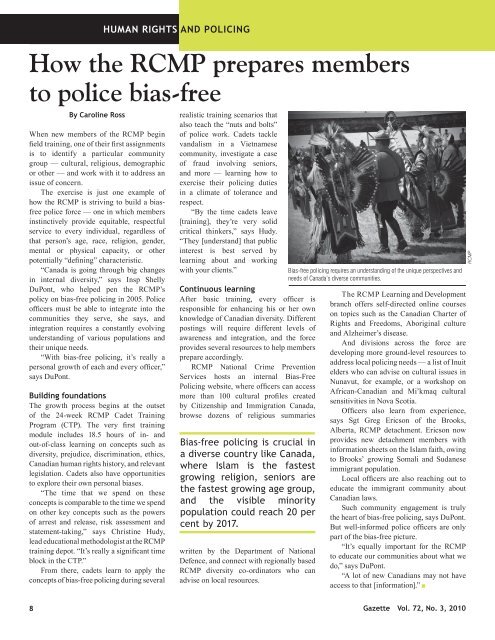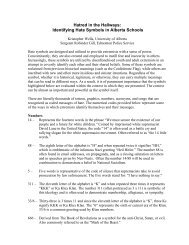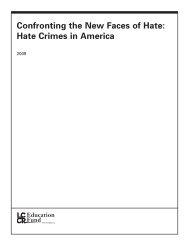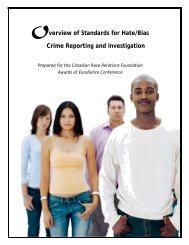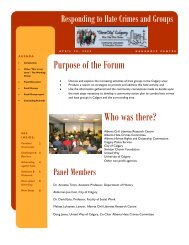RCMP Gazette Human Rights and Policing - Alberta Hate Crimes ...
RCMP Gazette Human Rights and Policing - Alberta Hate Crimes ...
RCMP Gazette Human Rights and Policing - Alberta Hate Crimes ...
Create successful ePaper yourself
Turn your PDF publications into a flip-book with our unique Google optimized e-Paper software.
huMAN RiGhTS AND POliCiNGhuMAN RiGhTS AND POliCiNGHow the <strong>RCMP</strong> prepares membersto police bias-freeby Caroline RossWhen new members of the <strong>RCMP</strong> beginfield training, one of their first assignmentsis to identify a particular communitygroup — cultural, religious, demographicor other — <strong>and</strong> work with it to address anissue of concern.The exercise is just one example ofhow the <strong>RCMP</strong> is striving to build a biasfreepolice force — one in which membersinstinctively provide equitable, respectfulservice to every individual, regardless ofthat person’s age, race, religion, gender,mental or physical capacity, or otherpotentially “defining” characteristic.“Canada is going through big changesin internal diversity,” says Insp ShellyDuPont, who helped pen the <strong>RCMP</strong>’spolicy on bias-free policing in 2005. Policeofficers must be able to integrate into thecommunities they serve, she says, <strong>and</strong>integration requires a constantly evolvingunderst<strong>and</strong>ing of various populations <strong>and</strong>their unique needs.“With bias-free policing, it’s really apersonal growth of each <strong>and</strong> every officer,”says DuPont.building foundationsThe growth process begins at the outsetof the 24-week <strong>RCMP</strong> Cadet TrainingProgram (CTP). The very first trainingmodule includes 18.5 hours of in- <strong>and</strong>out-of-class learning on concepts such asdiversity, prejudice, discrimination, ethics,Canadian human rights history, <strong>and</strong> relevantlegislation. Cadets also have opportunitiesto explore their own personal biases.“The time that we spend on theseconcepts is comparable to the time we spendon other key concepts such as the powersof arrest <strong>and</strong> release, risk assessment <strong>and</strong>statement-taking,” says Christine Hudy,lead educational methodologist at the <strong>RCMP</strong>training depot. “It’s really a significant timeblock in the CTP.”From there, cadets learn to apply theconcepts of bias-free policing during severalrealistic training scenarios thatalso teach the “nuts <strong>and</strong> bolts”of police work. Cadets tacklev<strong>and</strong>alism in a Vietnamesecommunity, investigate a caseof fraud involving seniors,<strong>and</strong> more — learning how toexercise their policing dutiesin a climate of tolerance <strong>and</strong>respect.“By the time cadets leave[training], they’re very solidcritical thinkers,” says Hudy.“They [underst<strong>and</strong>] that publicinterest is best served bylearning about <strong>and</strong> workingwith your clients.”Continuous learningAfter basic training, every officer isresponsible for enhancing his or her ownknowledge of Canadian diversity. Differentpostings will require different levels ofawareness <strong>and</strong> integration, <strong>and</strong> the forceprovides several resources to help membersprepare accordingly.<strong>RCMP</strong> National Crime PreventionServices hosts an internal Bias-Free<strong>Policing</strong> website, where officers can accessmore than 100 cultural profiles createdby Citizenship <strong>and</strong> Immigration Canada,browse dozens of religious summariesBias-free policing is crucial ina diverse country like Canada,where Islam is the fastestgrowing religion, seniors arethe fastest growing age group,<strong>and</strong> the visible minoritypopulation could reach 20 percent by 2017.written by the Department of NationalDefence, <strong>and</strong> connect with regionally based<strong>RCMP</strong> diversity co-ordinators who canadvise on local resources.Bias-free policing requires an underst<strong>and</strong>ing of the unique perspectives <strong>and</strong>needs of Canada’s diverse communities.The <strong>RCMP</strong> Learning <strong>and</strong> Developmentbranch offers self-directed online courseson topics such as the Canadian Charter of<strong>Rights</strong> <strong>and</strong> Freedoms, Aboriginal culture<strong>and</strong> Alzheimer’s disease.And divisions across the force aredeveloping more ground-level resources toaddress local policing needs — a list of Inuitelders who can advise on cultural issues inNunavut, for example, or a workshop onAfrican-Canadian <strong>and</strong> Mi’kmaq culturalsensitivities in Nova Scotia.Officers also learn from experience,says Sgt Greg Ericson of the Brooks,<strong>Alberta</strong>, <strong>RCMP</strong> detachment. Ericson nowprovides new detachment members withinformation sheets on the Islam faith, owingto Brooks’ growing Somali <strong>and</strong> Sudaneseimmigrant population.Local officers are also reaching out toeducate the immigrant community aboutCanadian laws.Such community engagement is trulythe heart of bias-free policing, says DuPont.But well-informed police officers are onlypart of the bias-free picture.“It’s equally important for the <strong>RCMP</strong>to educate our communities about what wedo,” says DuPont.“A lot of new Canadians may not haveaccess to that [information].” ▪<strong>RCMP</strong>8<strong>Gazette</strong> Vol. 72, No. 3, 2010


